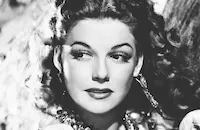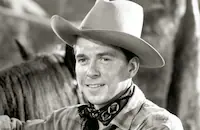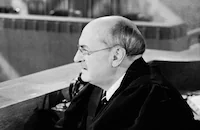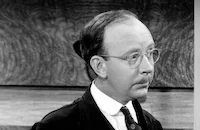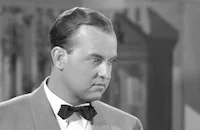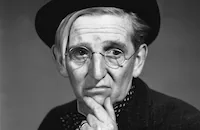Powell had come to Warner Bros. from a career as a big band vocalist, making his screen debut appropriately enough as a singer mixed up with gossip columnist Lee Tracy in Warner's Blessed Event (1932). He became a star when he sang love songs to Ruby Keeler in a series of Busby Berkeley musicals including 42nd Street, Gold Diggers of 1933 and Footlight Parade (all 1933). By the late ?30s, however, his star had begun to fall as audiences tired of the studio's backstage musicals. Naughty But Nice was his last film under contract to Warner Bros., and his role as a small-town music composer whose songs are stolen by a group of Tin Pan Alley types showed how resistant Warners was to changing his image. Tired of typecasting, he refused to sign a new contract with the studio, which retaliated by putting his last film there on the shelf. Powell would bounce back in 1945, when he reinvented himself as a tough leading man in the classic film noir Murder, My Sweet.
What prompted Warners to release Naughty But Nice a year later was the growing publicity for the film's second female lead, Ann Sheridan, cast as the sexy songbird who helps steal Powell's songs and tries to take him from his lyricist-girlfriend, Gale Page. Sheridan had been as green as they come when she arrived in Hollywood in 1933, one of six winners of Paramount Pictures' "Search for Beauty" contest. She learned fast and was the only contest winner to last longer than six months at the studio. Working her way through small roles and low-budget films, she picked up enough camera savvy to land a contract with Warner Bros. in 1936. She was gradually moving into better roles there when gossip columnist Walter Winchell labeled a publicity shot of her "umphy." Warner's publicity head Bob Taplinger changed the spelling and staged an "Oomph Dinner" at which a group of journalists and Warners employees officially voted her "The Oomph Girl." Warners took advantage of the publicity by finally releasing Naughty But Nice, with Sheridan promoted to star billing. For her part, Sheridan was grateful for the chance to play better roles, but never quite understood the label. As she told film historian John Kobal (People Will Talk), "it always reminded me of a fat man bending down to tie his shoelaces."
That Naughty But Nice survived its life on the shelf and late release, was due largely to Enright's breezy direction. The one-time editor and gag man for Mack Sennett had helped make hits out of Dames and Twenty Million Sweethearts (both 1934; both starring Powell). Unlike Powell, Enright survived the decline of the Warners musical by moving into action films, eventually signing with Universal, where he directed John Wayne, Randolph Scott and Marlene Dietrich in the 1942 re-make of The Spoilers.
Director: Ray Enright
Producer: Samuel Bischoff
Screenplay: Richard Macaulay, Jerry Wald
Based on the Story "Always Leave Them Laughing" by Macaulay and Wald
Cinematography: Arthur Todd
Art Direction: Max Parker
Music: Leo F. Forbstein
Principal Cast: Ann Sheridan (Zelda Manion), Dick Powell (Prof. Hardwick), Gale Page (Linda McKay), Helen Broderick (Aunt Martha), Allen Jenkins (Joe Dirk), ZaSu Pitts (Aunt Penelope), Ronald Reagan (Ed Clark).
BW-90m.
By Frank Miller




